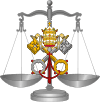Taxa Innocentiana
 |
| Part of a series on the |
| Jurisprudence of Catholic canon law |
|---|
|
|
|
Trials and tribunals |
|
Canonical structures Particular churches
|
|
|
Taxa Innocentiana was a decree issued by Pope Innocent XI on 1 Oct., 1678, regulating the fees that might be demanded or accepted by episcopal chancery offices for various acts, instruments, or writings. According to the decree, bishops or their officials were not allowed to accept anything though freely offered:
- for ordinations or anything connected therewith, such as dimissorial letters, etc.;
- for institution to benefices;
- for matrimonial dispensations.
In this last case, however, alms to be applied for religious uses could be demanded. A moderate charge, fixed by Innocent, may be exacted by the chancellor for expediting necessary documents, except those granting permission to say Mass, administer the sacraments, preach, etc. The Taxa Innocentiana was silent in regard to contentious matters, e. g. the charge for copies of the acts of ecclesiastical trials. Some maintained that Innocent's legislation was promulgated for Italy only, but it evidenced the will of the Church, and at least in substance was of universal application. The Sacred Congregation of the Council on 10 June 1896, modified the prescriptions of Innocent, decreeing that while taxes or fees may be imposed according to justice and prudence in matters pertaining to benefices and sacraments, especially matrimony; yet the sacraments themselves must be conferred without charge and pious customs connected therewith observed. In other matters not directly affecting the administration of the sacraments; e. g. dispensations from the banns, it is decreed that:
- laudable customs must be observed and allowances made for various circumstances of time, place, and persons;
- the poor are not to be taxed;
- in any case the amount demanded must be moderate, so that persons may not be deterred thereby from receiving the sacraments;
- as regards matrimony the exaction is to be remitted, if otherwise there would be danger of concubinage;
- in regard to benefices the tax must be in proportion to the fruits or income of the benefice in question;
- all such fees are to be determined not by individual bishops but in provincial council, or at least in a special meeting of the ordinaries of the province for this purpose.
The approval of the Holy See is required for the fees determined upon. Rome's sanction is given tentatively for five years to Italy, for ten years to other countries.
References
 This article incorporates text from a publication now in the public domain: Herbermann, Charles, ed. (1913). "Taxa Innocentiana". Catholic Encyclopedia. New York: Robert Appleton. cites:
This article incorporates text from a publication now in the public domain: Herbermann, Charles, ed. (1913). "Taxa Innocentiana". Catholic Encyclopedia. New York: Robert Appleton. cites:
- LUCIDI, De visitat. ss. liminum, doc. XX, III, 144.